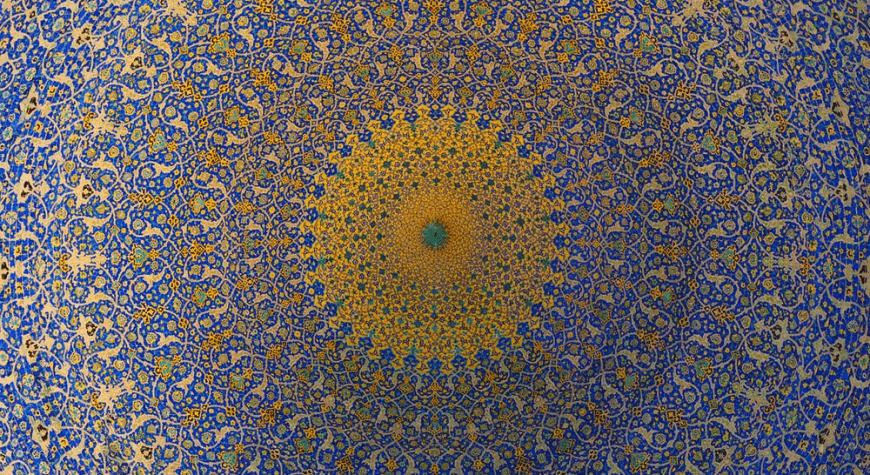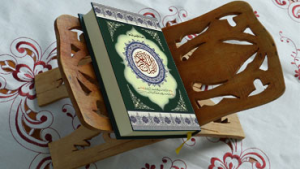Holy Quran

Amongst the revealed holy books, Holy Quran is the last book that was revealed to the last Nabi, Muhammad صَلَّى اللهُ تَعَالٰى عَلَيْهِ وَاٰلِهٖ وَسَلَّم. To recite it, teach it, look at it and touch it are all acts of worship. To publish the Holy Quran in a glorious way, to correctly translate and write commentary of it into different languages of the world, to teach Muslims how to recite the Holy Quran correctly, to send the Holy Quran to Masajid, Madaris, public places [such as at the Salah offering places of the airports, railway stations and bus stands, etc.] and to persuade people to act upon the commandments of the Holy Quran, etc. are different forms of serving the Holy Quran.
History of serving Quran
First of all, blessed companions رَضِىَ الـلّٰـهُ تَعَالٰی عَـنْهُم had the great privilege of serving the Holy Quran. They received the teachings of the Holy Quran from the Beloved Rasool صَلَّى اللهُ تَعَالٰى عَلَيْهِ وَاٰلِهٖ وَسَلَّم and conveyed the Holy Quran and its commandments to other Muslims. Some were privileged to memorise the Holy Quran. Moreover, after the [apparent] demise of the Beloved Rasool صَلَّى اللهُ تَعَالٰى عَلَيْهِ وَاٰلِهٖ وَسَلَّم, they compiled the Holy Quran. In the battle of Yamamah, after the martyrdom of many blessed companions رَضِىَ الـلّٰـهُ تَعَالٰی عَـنْهُم who were Huffaz [those who memorized the Holy Quran by heart], Sayyiduna ‘Umar Farooq-e-A’zam رَضِىَ اللهُ تَعَالٰی عَـنْهُ suggested Sayyiduna Siddeeq-e-Akbar رَضِىَ اللهُ تَعَالٰی عَـنْهُ to compile the Holy Quran. Accepting the suggestion of Sayyiduna ‘Umar Farooq رَضِىَ اللهُ تَعَالٰی عَـنْهُ, Siddeeq-e-Akbar رَضِىَ اللهُ تَعَالٰی عَـنْهُ ordered Sayyiduna Zayd Bin Saabit رَضِىَ اللهُ تَعَالٰی عَـنْهُ to compile the Holy Quran. (Sahih Bukhari, vol. 3, pp. 398, Hadees 4986)
 Then later on, Sayyiduna ‘Usman-e-Ghani رَضِىَ اللهُ تَعَالٰی عَـنْهُ got the copies prepared of the same compiled copy of the Holy Quran and sent them to the different areas. (Sahih Bukhari, vol. 3, pp. 399, Hadees 4987)
Then later on, Sayyiduna ‘Usman-e-Ghani رَضِىَ اللهُ تَعَالٰی عَـنْهُ got the copies prepared of the same compiled copy of the Holy Quran and sent them to the different areas. (Sahih Bukhari, vol. 3, pp. 399, Hadees 4987)
After the blessed companions, Tabi`een, then Tab’-e-Tabi’een and then pious predecessors رَحِمَهُمُ الـلّٰـهُ تَـعَالٰی of every era constantly served the Holy Quran and wrote countless books on the translation and commentary of the Holy Quran, explanation of the commandments of Quran, details of Uloom-e-Quran and answers to the objections raised against the Holy Quran. In short, they wrote countless books on a large number of Quranic topics.
Dear Islamic brothers! Pious predecessors had incomparable love for the Holy Quran and had a great passion for serving the Holy Quran. On the other hand, today’s Muslim is getting away from the Holy Quran. The passion for reciting this great book, studying its translation and commentary and acting upon its commandments is decreasing day by day.
Unfortunately, now it seems as if the Holy Quran is used only for swearing an oath at the time of a fight or quarrel and for attaining blessing on the occasion of wedding by keeping it over the head of the bride. Under such troublesome conditions, Dawat-e-Islami, the Madani movement of the devotees of Rasool, is making efforts in different ways to strengthen the relationship of Muslims with the Holy Quran and to spread the blessings of the Holy Quran all around. Few glimpses are presented below as to how Dawat-e-Islami is serving the Holy Quran.
Serving Quran through teaching
Under the supervision of Dawat-e-Islami, Madrasa-tul-Madinah for adult [men] and Madrasa-tul-Madinah for adult [women] have been established to teach the Holy Quran with correct rules of pronunciation and articulation to Islamic brothers and Islamic sisters in Pakistan and abroad free of charge; whereas Madrasa-tul-Madinah (for boys) and Madrasa-tul-Madinah (for girls) have been established to give the education of Hifz and Naazirah to Madani children (boys and girls). Moreover, Madrasa-tul-Madinah online has also been established for those places where teachers for teaching the Holy Quran are not easily available.
In many Madaris-ul-Madinah, the facilities of lodging and food are also provided to Madani children (boys). Non-residential Madaris-ul-Madinah have the duration of 8 hours, whereas part time Madaris-ul-Madinah having a duration of 1 and 2 hours are also functioning and showering their blessings.
اَلْحَمْدُلِلّٰہ عَزَّ وَجَلَّ, at present, approximately 2,734 Madaris-ul-Madinah have been established in Pakistan and abroad in which, approximately 128,737 Madani children (boys and girls) are receiving education; whereas the number of total Madani staff including teachers is approximately 7,268. In 2017, approximately 5,229 Madani children (boys and girls) completed Hifz-e-Quran (memorization of the Holy Quran) and approximately 20,580 were privileged to complete the Naazirah of the Holy Quran. So far, approximately 74,329 Madani children (boys and girls) have been privileged to complete the Hifz of the Holy Quran, while approximately 215,882 Madani children (boys and girls) have been privileged to complete the Naazirah of the Holy Quran. In Madrasa-tul-Madinah online, approximately 7,000 male and female students are studying from all over the world. There are approximately 633 teachers teaching them, while the number of Madani staff (Nazimeen, Mufattisheen, etc.) is 140. There are approximately 13,853 Madrasa-tul-Madinah for adult men in Pakistan and abroad and the students studying there are approximately 89,043 in number, whereas the female students studying in Madrasa-tul-Madinah for women are approximately more than 63,000 in number.)
Similarly, اَلْحَمْدُلِلّٰہ عَزَّ وَجَلَّ, education of the Holy Quran is also included in the syllabus of Jami’a-tul-Madinah established under the supervision of Dawat-e-Islami. This syllabus has been designed in such a way that Madani Qa’idah and the entire Holy Quran along with its translation and commentary are taught from Darjah Mutawassitah Awwal to Darjah Khaamisah (5th year), whereas Tajweed and the revision of Parah 26 to 30 with Hadar [حَدر] are done in Darjah Saabi’ah (7th year) and Tarbiyyat [training] about Husn-e-Qira`at is given in Darjah Daurah Hadees.
(اَلْحَمْدُلِلّٰہ عَزَّ وَجَلَّ, there are 526 branches of Jami’a-tul-Madinah established in Pakistan and abroad in which more than 42,770 male and female students are receiving the education of Dars-e-Nizami (‘Aalim course). Moreover, 6871 male and female students have completed Dars-e-Nizami.

